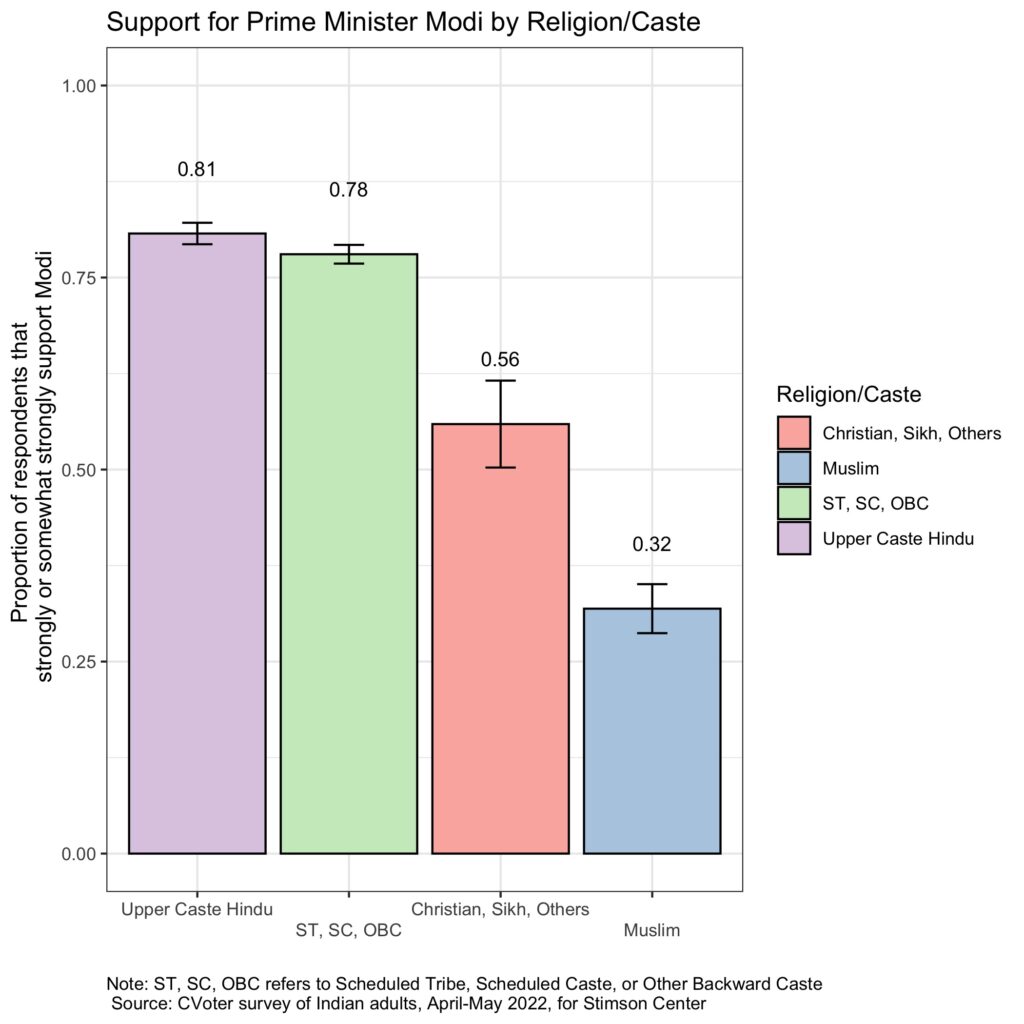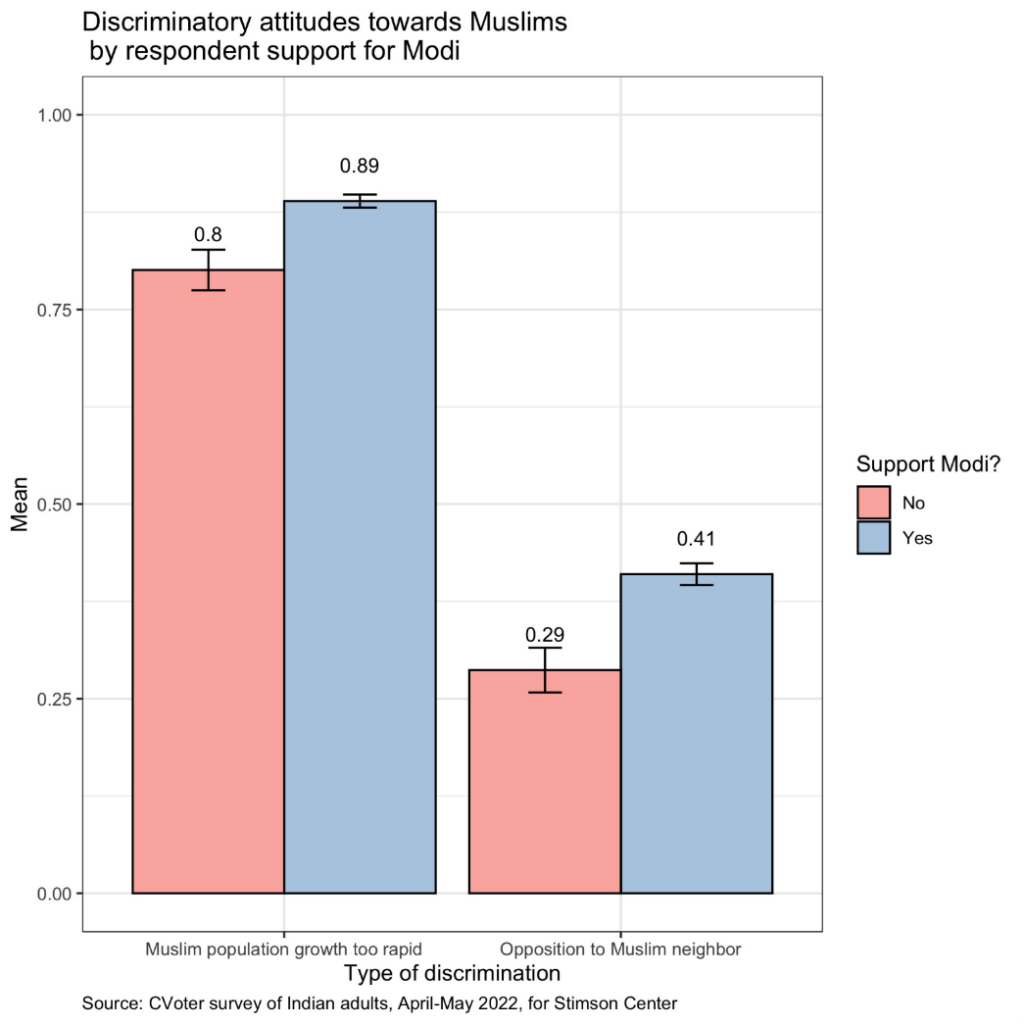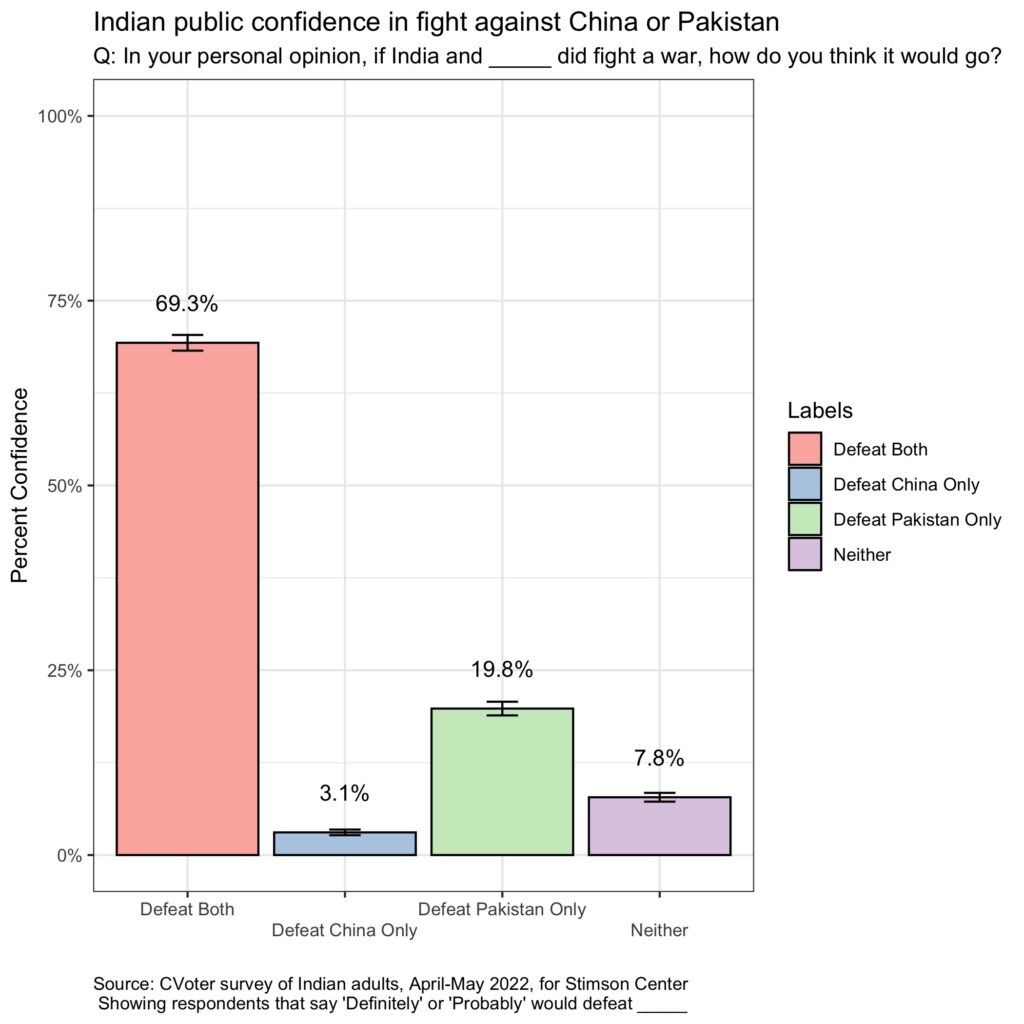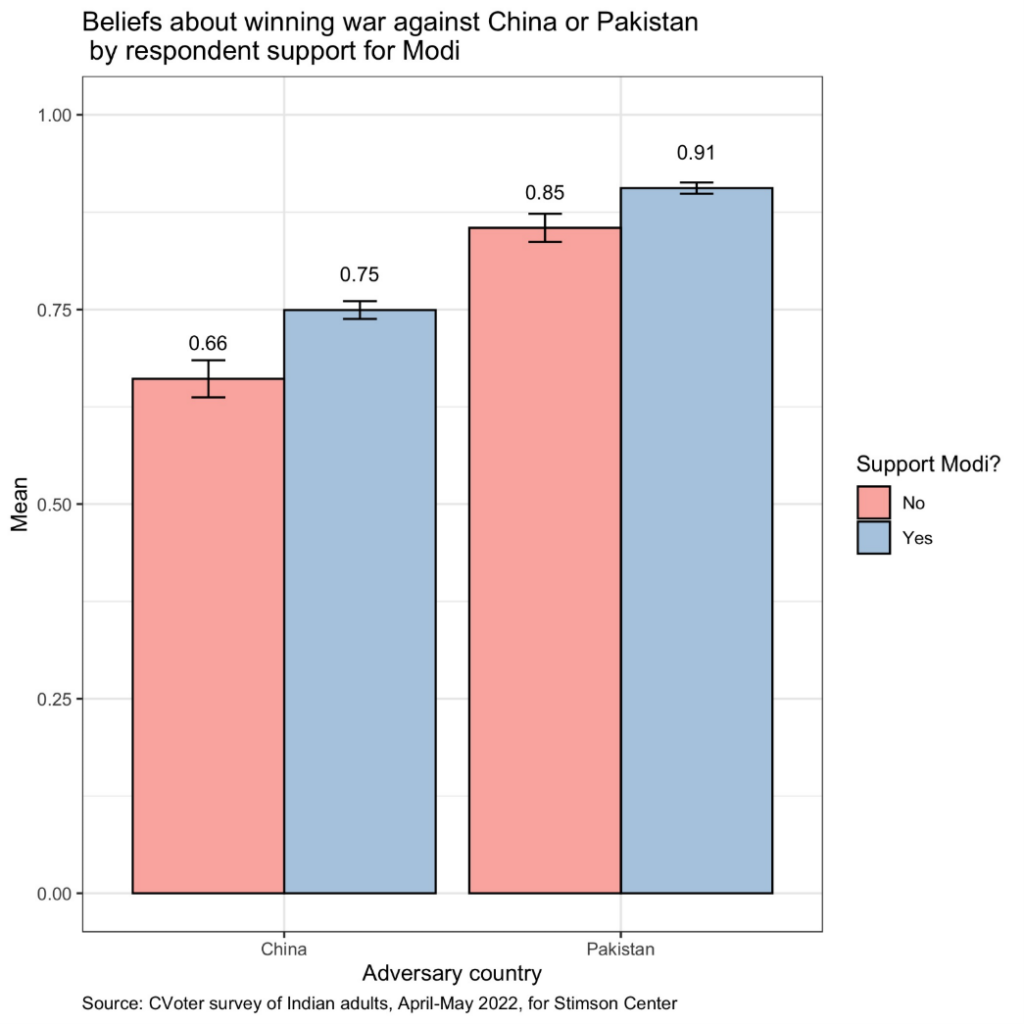Confidence and Nationalism rising in Modi’s 'New India'
Source : Stimson
 |
| Representative Image |
A new survey in India examines public opinion on domestic politics and national security issues to understand the political incentives leaders face during interstate crises in Southern Asia. This survey reveals how public attitudes could shape Indian diplomacy, crisis escalation, and nuclear force development. The nature of popular views on these topics and their effects on elite decision-making are understudied. Understanding those incentives would help the United States and other diplomatic partners of India clarify mutual expectations and promote regional stability.
Please
join us for a discussion with the authors of this recent groundbreaking
publication, here.
A new
7000-person survey conducted by phone in India between April 13 and May 14,
2022, finds:
- high levels of support for
Prime Minister Narendra Modi, who likely remains among the most popular
national leaders in the world today;
- extraordinary nationalist
sentiment among Indians, at high levels compared to prior cross-national
surveys using identical question wording;
- troubling signs of intolerance
toward India’s large Muslim minority, which helps provide context to recent
controversies;
- strong confidence in the Indian
government’s ability to defend India against potential domestic and
foreign threats;
- expectations among a majority
of Indian respondents that the U.S. military would support India in the
event of a war with China or Pakistan; and
- large majorities in favor of
Indian numerical nuclear superiority against its adversaries.
The survey
was intended to measure Indian attitudes towards the current government,
India’s domestic challenges, and inter-state disputes as part of a broader
Stimson Center initiative to understand the political incentives leaders face
during interstate crises in southern Asia.1 This nationally representative
survey was translated and fielded in 12 languages for respondents in all 28 Indian
states and 6 of India’s 8 union territories by the Centre for Voting Opinion
& Trends in Election Research (CVoter).2 CVoter is a widely used
public opinion firm that regularly partners with Indian newspapers, magazines,
television news channels, as well as academic researchers.3 This project
note outlines the key descriptive findings from the survey.4
Political Support and Partisan Leanings
Prime
Minister Modi received support from a large majority in our survey, with 71%
either somewhat or strongly supporting him.5 This confirms a notable
positive shift from last year when Modi’s approval levels were dampened by the
COVID-19 crisis and challenged later in 2021 due to his government’s
controversial farm laws.6 Support for his party, the Bharatiya Janata
Party (BJP), was also high at 61%. Hindu respondents were significantly more
likely to support Modi and the BJP relative to non-Hindu respondents in the
sample (see Figure 1).

Figure 1.
Worryingly,
supporters of Modi or the BJP were more likely to express discriminatory
attitudes toward Muslims, such as stating they did not want to have a Muslim as
a neighbor or that they believed India’s Muslim population was growing too
fast.7 It is worth stating, however, that among all non-Muslim
respondents, including both Modi supporters and skeptics, such discriminatory
attitudes were widespread. An overwhelming majority of 78 percent of
respondents stated that they believed India’s Muslim population was growing too
fast. Such attitudes may explain why the historically secular Indian National
Congress has publicly sought to disassociate itself from any “branding… as a
Muslim party”8 and why other parties with nationwide aspirations, such as
the Aam Aadmi Party, have also been accused of embracing a softer version of
Hindu nationalist politics.9 Such anti-Muslim sentiments could generate
meaningful international repercussions if they influence national policy or
political statements, a tendency which may be reflected in recent
controversies. For example, India received considerable criticism from Muslim-majority
countries following derogatory statements about the Prophet Mohammad made by
BJP spokespersons.10 The U.S. government too has expressed concern about
restrictions against and violence targeted at Indian religious minorities.11

Figure 2.
Nationalism
Respondents were overwhelmingly nationalistic in their responses. 90% strongly or somewhat agreed with the statement that “India is a better country than most other countries.” This number, large in absolute terms, is also large when compared to other contexts.12 U.S. citizens, for example, are typically viewed as more nationalist than average, but in 2014 only 70 percent of respondents strongly or somewhat agreed that the U.S. is a better country than most.13 While American exceptionalism is a well-understood domain of study, self-perceptions of Indian exceptionalism are relatively underexplored.
Nationalist
sentiment dovetailed with negative opinions of neighboring countries. When
asked about Pakistan, 67% of respondents expressed their “dislike to a great
extent” and a nearly equivalent 65% “disliked” China to “a great extent.” These
views covaried in intuitive ways, such that respondents with greater levels of
baseline support for Modi were more likely to hold negative opinions of
Pakistan and China, and more nationalistic individuals were also more likely to
believe India could defeat China and Pakistan militarily.
A majority of
respondents said that the United States would “definitely” or “probably” help
in the event of an Indian war with China (56 percent) or Pakistan (59
percent).
Respondents
in India’s south tended to have somewhat more favorable—though still
overwhelmingly negative—views of China, but this north-south distinction was
less evident in attitudes toward Pakistan. We find little evidence that
unfavorable opinions toward China or Pakistan vary substantively by respondent
age.

Figure 3.
Nationalist sentiment also manifested as confidence in India’s military prowess and state strength. 90% of respondents said that India would probably or definitely defeat Pakistan in case of a war between the two hostile neighbors. A smaller, but still sizeable, percentage (72%) believed that India would probably or definitely defeat China in the event of a war. This may mirror confident public statements by Indian military officials,14 but deviates from some expert analysis which suggests that India is likely at a disadvantage in a military contest with China.15 Modi supporters were modestly more likely to assess that India could defeat China or Pakistan than non-supporters.

Figure 4
Views of Indian Conflict Scenarios and Nuclear Weapons Needs
Respondents
were divided about whether other countries would come to India’s defense in the
event of an international conflict. A majority of respondents said that the
United States would “definitely” or “probably” help in the event of an Indian
war with China (56 percent) or Pakistan (59 percent), with a remaining large
minority skeptical of U.S. aid in such scenarios. In contrast, surveys of U.S.
respondents have found sizeable majorities might prefer to avoid entanglement
in a Sino-Indian military conflict.16 For their part, Indian military
leaders and strategists have stressed that India will have to fight its own wars
alone without counting on others.17
A similar
majority of Indian respondents assessed China would come to Pakistan’s aid in
the event of an Indo-Pakistani war (56 percent) and that Pakistan would come to
China’s aid in the event of a Sino-Indian war (59 percent) consistent with
Indian strategists’ fears of a “two-front war.” Combining these results shows
that a large minority of respondents, roughly 4 in 10, foresee a scenario where
India might have to fight both China and Pakistan simultaneously without U.S.
help.
An overwhelming majority
of respondents—68 percent—assessed India needed more nuclear weapons than its
enemies.
We also asked about respondent views on the number of nuclear weapons India needs. An overwhelming majority—68 percent—assessed India needed more than its enemies. Just 13 percent said India should have about as many nuclear weapons as its enemies, and only a handful assessed that India should only have “a few” or “not any” nuclear weapons. These public preferences may be incompatible with India’s current nuclear force structure where most non-governmental organizations assess that China has more operational nuclear weapons than India while Pakistan has the same or slightly more nuclear weapons than India. 18 If these preferences hold, they could serve as a political driver for an arms race with China, which U.S. assessments forecast could quadruple its nuclear forces to 1,000 weapons by 2030.19
Implications
The nature
of Indian public opinion on national security issues and the effect of mass
views on elite decision-making—which together determine the foreign policy
“accountability environment”—remains remarkably understudied.20 Yet our
survey identifies several areas where public views may shape Indian government
preferences in ways that will be important for India’s diplomatic partners to
understand. Several implications appear most prominent from our
analysis.
- No signs of erosion of Modi’s
domestic political support: Our findings reaffirm other polls that show Modi
is one of the most popular leaders—and perhaps the most popular
leader—of any democratic country.21 This is true despite seeming
missteps his government made in the face of the pandemic and associated
economic travails.
- India’s extraordinary nationalism may
prove challenging for Indian diplomatic partners to navigate: Status concerns are common in
global politics, but the Indian polity appears to hold broadly a belief
that India is better than most other countries. India’s Minister of
External Affairs has popularized the idea that India will go “the India
way.”22 Our findings indicate Indian citizens may perceive few
reasons to compromise on issues like relations with Russia or its domestic
institutions given India’s position in world politics.
- Widespread support for anti-Muslim
attitudes may create domestic political incentives for anti-Muslim
policies: Modi’s
government has faced sustained allegations of anti-Muslim animus. Our
survey results suggest that popular attitudes toward Muslims may encourage
rather than halt any anti-Muslim impulses of the BJP-led government. Such
sentiment could stoke friction between New Delhi and its neighbors and
regional partners, a danger highlighted following recent anti-Muslim
remarks expressed by members of the ruling party.23
- Indian self-confidence may lead to
mistaken popular views of Indian military prowess: India has considerable military
capabilities against its most likely regional opponents.24 Yet Indian
confidence that India would likely defeat China or Pakistan may exceed what
a careful net assessment might warrant. This in turn might make it
challenging for Indian leaders to back down in crises, since their publics
may view such conflicts as winnable even if the military balance is not in
their favor.25
- U.S. officials may seek to signal
their willingness to aid India in the event of conflict with China to
correct widespread popular doubts: A majority of Indians believe the U.S. would
assist it in the event of a conflict with China or Pakistan. The United
States likely could do more to publicly signal its reliability regarding a
China contingency. The United States offered considerable material support
to India in past crises with China (in 1962 and 2020) but both times
cloaked some of that assistance in secrecy based on the requests of New
Delhi.26 At the same time, U.S. officials likely do not foresee
significant material support in the event of an India-Pakistan conflict
and instead seek to retain a viable third-party crisis management role.
U.S. officials should be aware that they may struggle to fulfill Indian
public expectations in such circumstances.
- Public opinion may encourage rather
than restrain any contemplated future Indian nuclear force buildup. Our poll finds an Indian
public that prefers Indian numerical nuclear superiority against its
adversaries by large margins. It is consistent with earlier public opinion
research that suggested that the Indian public was comfortable with
nuclear weapons as tools of statecraft in specific, plausible scenarios.27 Such
views help provide context to Prime Minister Narendra Modi’s decision to
emphasize on the campaign trail in 2019 that Indian nuclear weapons were
not kept as mere showpieces.28 Based on limited inquiries to date,
further research is needed to untangle public understanding of nuclear
weapons and their salience in contemporary debates.






No comments: